Lucky Rabbit, a free knitting pattern from Knitty.com.
INTRODUCTION
Lucky Rabbit
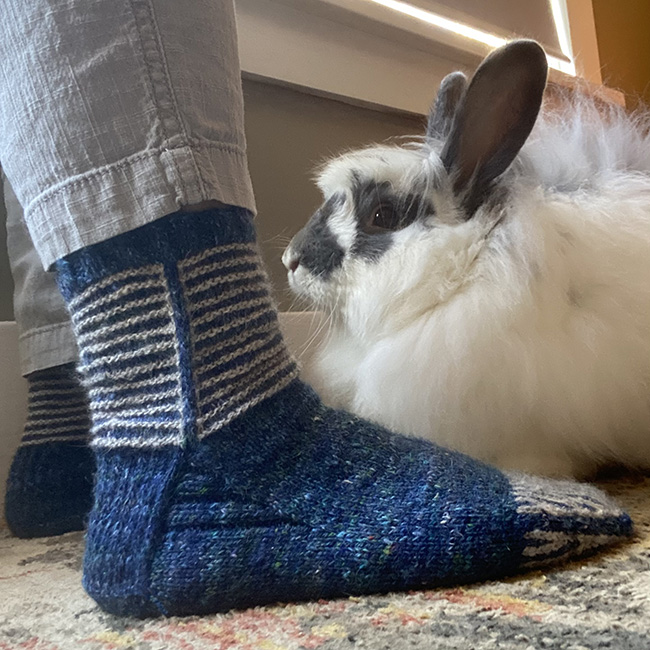 by Stefanie Johnson
by Stefanie Johnson
![]()
These socks are a celebration of the Year of the Rabbit! As a cuniculturist, it's my favorite year of the Chinese zodiac. Folklore tells us that the animals of the Chinese zodiac were those 12 that successfully raced across a river to the Jade Emperor. The rabbit was crossing the river by leaping from stone to stone. Luckily, when the rabbit almost fell into the river, he was able to grab a floating log and was instead washed to shore, coming in fourth place.
The Chinese culture considers the rabbit the luckiest of the twelve animals represented in the zodiac. It symbolizes mercy, elegance, and beauty; those who are born in a year of the rabbit are calm, peaceful, and artistic. I was born in a year of the sheep (sometimes also translated as goat), which seems the other appropriate zodiac sign for a fiber artist!
Twelve garter ridges grace the legs of these socks representing the 12 animals of the zodiac, with a few slipped stitches separating the front and back. The socks are knit in the spiral fashion, with the new yarn being picked up from under the working yarn without twisting the yarns during color changes. The stranded toes are extra warm and soft to fight winter chill. As the socks get worn and washed, the angora in the CC yarn will bloom, creating a soft halo. The CC yarn was spun woolen-style for a fluffy, warm yarn while the MC was spun semi-worsted style for durability, much needed in the foot of a sock. When looking for a commercial alternative to handspun angora and wool blend yarn, consider looking on Etsy; there are many small farms and indie dyers that offer angora blend yarns. Just remember that a little angora goes a long way! Using a yarn with a higher percentage of angora in it will obscure the design.
 photos: Stefanie Johnson
photos: Stefanie Johnson
SIZE
Adult S[M, L, XL]
FINISHED MEASUREMENTS
Foot circumference: 6.5[7.5, 8.5, 9.5] inches/ 17[19, 21.5, 23.5] cm
Leg Length: 3.5 inches/9 cm as shown, adjustable according to preference
Choose a size with approximately 1 inch/2.5 cm negative ease in foot circumference.
MATERIALS
Yarn
![]() [MC] Lana Llama Crafts [Superwash Merino Wool; top]; color: Salto; 2 ounces/57 grams blended on a drum carder with Sheepishly Wool [Leicester Longwool; locks]; color: hand-dyed greens; 0.5 ounce/14 grams and Feltrite Fibers [Mulberry Silk; top]; color Tuareg Navy Blue; 0.25 ounce/7 grams; and Paradise Fibers [Recycled Sari Silk; pulled roving]; colors: green, white, & aqua; 0.25 ounce/7 grams combined.
[MC] Lana Llama Crafts [Superwash Merino Wool; top]; color: Salto; 2 ounces/57 grams blended on a drum carder with Sheepishly Wool [Leicester Longwool; locks]; color: hand-dyed greens; 0.5 ounce/14 grams and Feltrite Fibers [Mulberry Silk; top]; color Tuareg Navy Blue; 0.25 ounce/7 grams; and Paradise Fibers [Recycled Sari Silk; pulled roving]; colors: green, white, & aqua; 0.25 ounce/7 grams combined.
![]() [CC] Fiber Traveler [Merino wool; raw fleece]; color: natural (white); 1.2 ounces/34 grams blended on a drum carder with Settlers Grove [Angora; cloud]; color: Silver; 0.4 ounces/11 grams
[CC] Fiber Traveler [Merino wool; raw fleece]; color: natural (white); 1.2 ounces/34 grams blended on a drum carder with Settlers Grove [Angora; cloud]; color: Silver; 0.4 ounces/11 grams
Yarn Characteristics
![]() Preparation: [MC] carded rolags; [CC] carded batt
Preparation: [MC] carded rolags; [CC] carded batt
![]() Finished Yarn: [MC] 268 yds/241 meters; [CC]126 yds/113 meters (see photos)
Finished Yarn: [MC] 268 yds/241 meters; [CC]126 yds/113 meters (see photos)
![]() Wraps per inch: [MC] 14; [CC] 12
Wraps per inch: [MC] 14; [CC] 12
![]() Yarn classification: [MC] heavy fingering; [CC] sport
Yarn classification: [MC] heavy fingering; [CC] sport
![]() Ply: [MC] 4-ply, [CC] 2-ply
Ply: [MC] 4-ply, [CC] 2-ply
![]() Ratio: 8:1 for singles and plying
Ratio: 8:1 for singles and plying
![]() Yardage used: [MC] 220 yds/198 meters; [CC] 62 yds/56 meters
Yardage used: [MC] 220 yds/198 meters; [CC] 62 yds/56 meters
![]() Drafting method: [MC] short forward draw, semi-worsted; [CC] short backwards draw, semi-woolen
Drafting method: [MC] short forward draw, semi-worsted; [CC] short backwards draw, semi-woolen
All singles were spun "Z" and plied "S"
For the MC, I wanted some texture and color variation, which I prefer over solid-color rovings. Digging through my fiber stash, I found some small amounts of green sari silk as well as the Leicester Longwool locks left over from a previous project. I spun a blend of 73% Merino wool, 17% Leicester Longwool, and 10% silk). For a little added strength, one of the four plies was 100% mulberry silk. For the remaining three plies, the wool and silk fibers were gently blended on my drumcarder and then dizzed off into roving. My resulting yarn had a tweed-like appearance with a lovely sheen, thanks to the silk and longwool content.

For the CC, I blended a batt consisting of 25% angora cloud from my French Angora rabbit, Louie L'Amour, and 75% Merino wool from a raw fleece that I purchased & scoured. I began by teasing apart the scoured and dried wool locks and feeding them into the drum carder. I removed the batt from the drum carder and split it into 8 lengthwise strips. I teased those widthwise and laid one on the infeed drum platform, teased apart some of the angora cloud and sandwiched that under another thin layer of wool to help hold the angora in place prior feeding it in, because it has a tendency to float away. I repeated that 3 more times and removed the batt from the drum. I rolled it lengthwise and pre-drafted from the large batt prior to spinning woolen-style.

Commercial yarn alternatives:
![]() [MC] Regia 4 Ply 75% wool/25% Polyamide; 230yds/210m per 1.8oz/50g skein]; color: Royal Blue; 1[1, 2, 2] skeins
[MC] Regia 4 Ply 75% wool/25% Polyamide; 230yds/210m per 1.8oz/50g skein]; color: Royal Blue; 1[1, 2, 2] skeins
![]() [CC] Settlers Grove handspun [75/25 Merino Wool/Angora Yarn; about 105yd/96m per 1oz/28g skein]; color: Grey; 1 skein
[CC] Settlers Grove handspun [75/25 Merino Wool/Angora Yarn; about 105yd/96m per 1oz/28g skein]; color: Grey; 1 skein
OR
![]() [CC] AvillionFarmFibers [80/20 Wool/Angora Yarn; ]250yd/229m per 2oz/56g skein]; color: Bluish Gray; 1 skein
[CC] AvillionFarmFibers [80/20 Wool/Angora Yarn; ]250yd/229m per 2oz/56g skein]; color: Bluish Gray; 1 skein
OR
![]() [CC] Madelinetosh Pashmina [75% Superwash Merino Wool/15% Silk/10% Cashmere; 360yd/329m per 4.13oz/117g skein]; color: Great Grey Owl; 1 skein
[CC] Madelinetosh Pashmina [75% Superwash Merino Wool/15% Silk/10% Cashmere; 360yd/329m per 4.13oz/117g skein]; color: Great Grey Owl; 1 skein
Recommended needle size
[always use a needle size that gives you the gauge listed below - every knitter's gauge is unique]
![]() US #1/2.25 mm needles for small circumference in the round
US #1/2.25 mm needles for small circumference in the round
![]() US #2/2.75 mm needles for small circumference in the round
US #2/2.75 mm needles for small circumference in the round
Notions
![]() stitch markers
stitch markers
![]() yarn needle
yarn needle
GAUGE
36 sts/50 rows = 4 inches/10 cm in stockinette stitch on smaller needles
34 sts/40 rows = 4 inches/10 cm in stranded stockinette stitch on larger needles
PATTERN NOTES
[Knitty's list of standard abbreviations and techniques can be found here.]
Construction Method
These socks are knit cuff-down and feature a heel flap and ribbed gusset to improve the fit of a stockinette stitch foot that allows the handspun yarn to shine.
For a longer leg, you can work additional rounds of ribbing at the cuff, or extend the MC section after the leg patterning.
When changing colors, pick up the new color from underneath the color just used; do not twist colors at the beginning of the round.
DIRECTIONS
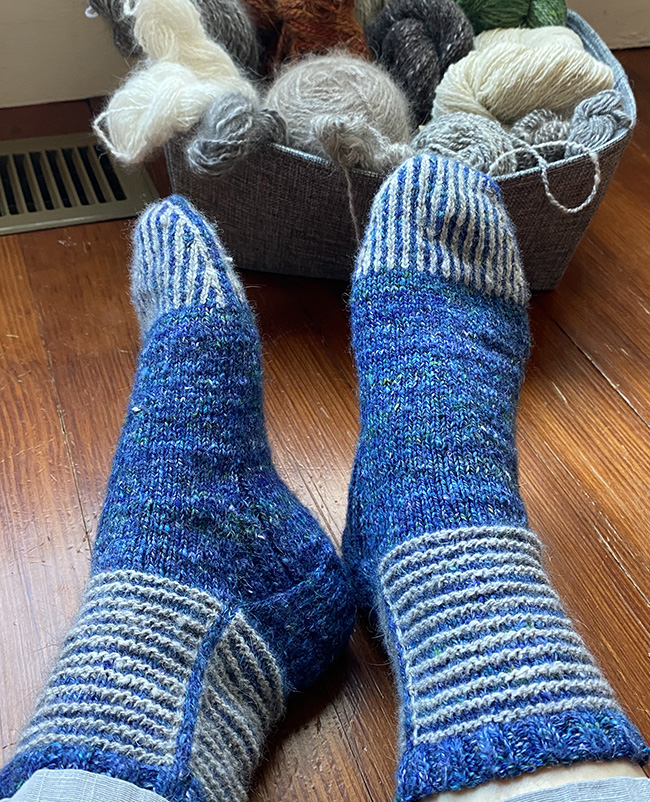
Leg
Using larger needles, MC, and the cable cast on method, CO 60[68, 76, 84] sts. Distribute sts across needles as you prefer and join for working in the round. Note or mark start of round.
Cuff round 1: (K2, p2) around.
Repeat cuff round 4 times more.
Change to smaller needles.
Set-up round: K.
Join CC.
Rnd 1: With CC, (s1p, k 28[32, 36, 40] , s1p) twice.
Rnd 2: With CC, (s1p, p 28[32, 36, 40] , s1p) twice.
Rnds 3-4: With MC, (k1, s1p, k 26[30, 34, 38] , s1p, k1) twice.
Rep Rnds 1-4, 10 times more, then Rnds 1-2 once more.
Cut CC and continue in MC only.
K 1 round in MC.
See Pattern Notes for suggestions if you wish to adjust the leg length.
Heel Flap
Turn work so the WS is facing you; the heel flap is worked on the last 30[34, 38, 42] sts.
Row 1 [WS]: Sl1, p 29[33, 37, 41] sts.
Row 2 [RS]: (Sl1, k1) 15[17, 19, 21] times.
Repeat Rows 1-2 16[17, 18, 19] more times, then Row 1 once more.
Heel Turn
Row 1 [RS]: Sl1p wyib, k 16[18, 20, 22] , ssk, k1, turn.
Row 2 [WS]: Sl1p wyif, p5, p2tog, p1, turn.
Row 3: Sl1p wyib, k to 1 st before gap, ssk, k1, turn.
Row 4: Sl1p wyif, p to 1 st before gap, p2tog, p1, turn.
Repeat Rows 3-4 4[5, 6, 7] times more; all heel sts have been worked and 18[20, 22, 24] sts remain.
Gusset
Resume knitting in the round.
Setup rnd 1: K across the 18[20, 22, 24] rem heel sts, then pick up & knit 17[18, 19, 20] sts in the edge of the heel flap, using the slipped sts as a guide, plus one extra st in the corner to prevent a gap. With the left needle, pick up the left leg of the last MC stripe rnd st and knit the 1st st of the next rnd together with it (k2tog), then work across remaining instep sts in st st until there is 1 st left. Sl1, with the right needle pick up the right leg of the next MC st on the last back of leg stripe and ssk it together with the last instep st. This is the end of the instep; place a marker or arrange sts as you prefer. Pick up &knit 18[19, 20, 21] sts in the edge of the heel flap, using the slipped sts as a guide, then k 24[27, 29, 32] sts, (p2, k2) 3[3, 2, 2] times, p 0[0, 2, 2] , k 0[0, 1, 1] . This takes you to the end of the sole sts/start of the instep. This is the new start of round. 84[92, 100, 108] sts.
Setup rnd 2: Work across instep as set; (k2, p2) 3 times, k 30[34, 38, 42] , (p2, k2) 3 times.
Gusset Decreases
Decrease round: Work across instep as set, ssk, work in patt as set to 2 sts before instep, k2tog. 2 sts decreased.
Next round: Work in patt as set.
Repeat last 2 rounds, 11 more times. 60[68, 76, 84] sts.
Foot
Cont in st st until foot measures 2.5[2.5, 2.75, 3] inches/ 6.5[6.5, 7, 7.5] cm shorter than desired foot length.
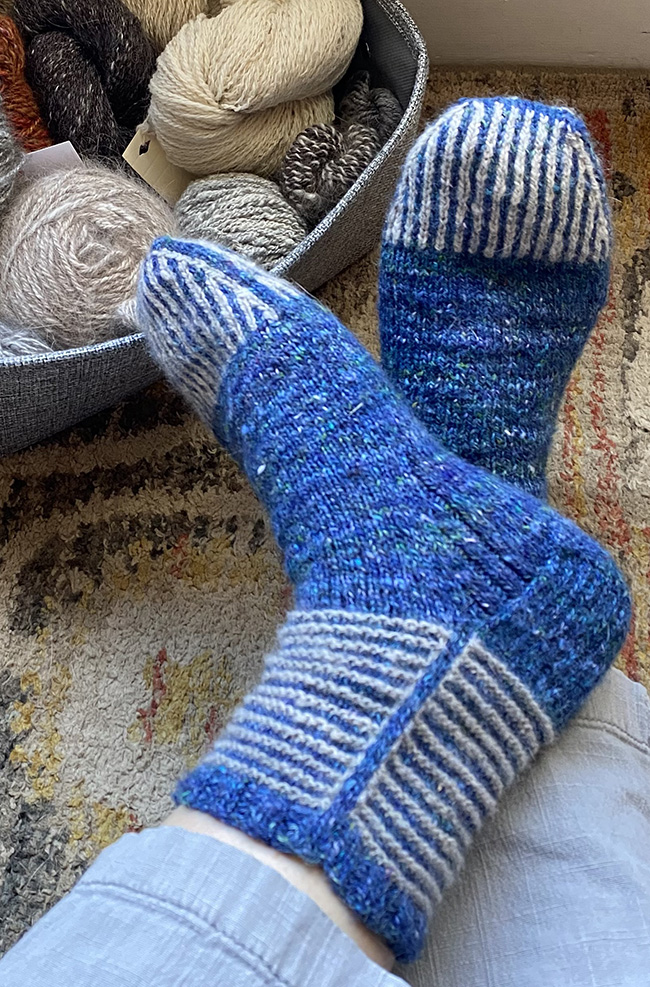
Toe
Note: The toe is worked in vertical, stranded stripes.
Change to larger needles.
Right sock set up round: K1 MC, ssk CC, (k1 MC, k1 CC) 13[15, 17, 19] times, k1 MC; k1 MC, (k1 CC, k1 MC) 13[15, 17, 19] times, k2tog CC, k1 MC. 58[66, 74, 82] sts
Left sock set up round: K1 MC, (k1 CC, k1 MC) 13[15, 17, 19] times, k2tog CC, k1 MC; k1 MC, ssk CC, (k1 MC, k1 CC) 13[15, 17, 19] times, k1 MC. 58[66, 74, 82] sts
29[33, 37, 41] sts each on both halves, the instep and sole; instep and sole both start and end with a stitch in MC. The following instructions refer to "the end of the half" – you'll work the repeat twice, once across the instep, once across the sole.
Work 3 rounds in vertical stripes as set.
Decrease round: [K1 MC, ssk CC, work in vertical stripes until 3 sts before the end of the half, k2tog CC, k1 MC] twice. 4 sts decreased.
Work 2 rounds in vertical stripes as set.
Rep last 3 rounds 3[3, 3, 4] times more. 42[50, 58, 62] sts rem.
Repeat Decrease round.
Work 1 round in st st stripes as set.
Rep last 2 rounds 2[2, 3, 3] more times. 30[38, 42, 46] sts rem.
Work Decrease round. 2[3, 3, 3] times more. 22[26, 30, 34] sts rem.
Cut CC yarn and continue with MC yarn only.
Work Decrease round. once more. 18[22, 26, 30] sts rem.
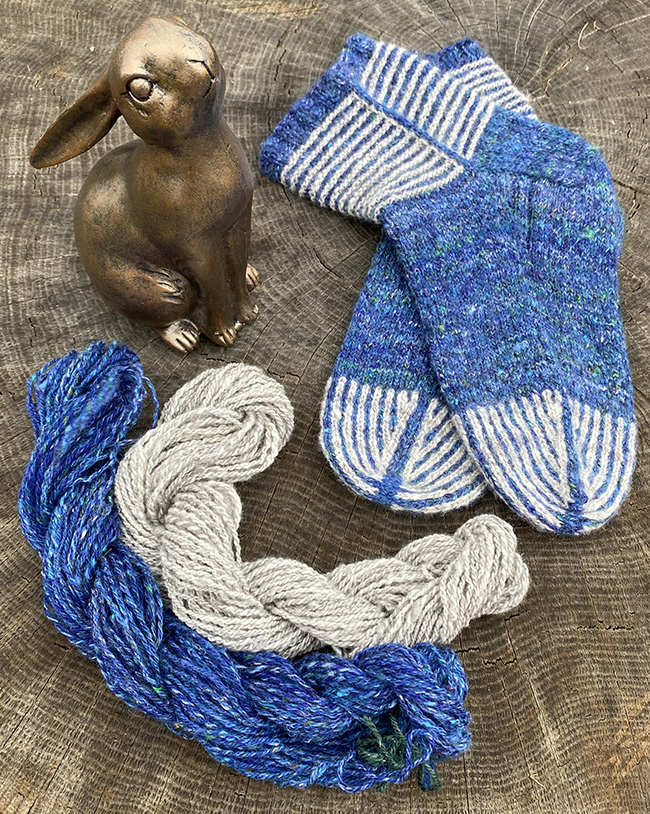
FINISHING
Cut yarn, leaving a 12 inch/ 30 cm tail. With yarn needle, graft toe sts closed. Weave in ends. Handwash the socks by soaking them in warm water with wool wash for 5 minutes, then pressing excess water out of them by wrapping them in a towel and squeezing them.
ABOUT THE DESIGNER
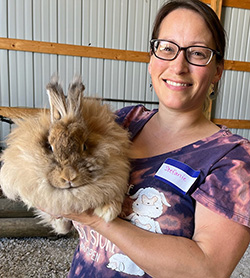 STEFANIE JOHNSON spends her days protecting public health through environmental inspections and investigations. On their Illinois hobby farm, Settlers Grove, the Johnsons are surrounded by French Angora rabbits, honeybees, chickens, ducks, and trees. Stefanie spends the remainder of her time creating and teaching spinning, knitting, dyeing, and weaving.
STEFANIE JOHNSON spends her days protecting public health through environmental inspections and investigations. On their Illinois hobby farm, Settlers Grove, the Johnsons are surrounded by French Angora rabbits, honeybees, chickens, ducks, and trees. Stefanie spends the remainder of her time creating and teaching spinning, knitting, dyeing, and weaving.
In addition to Knitty, her work has appeared in Spin Off, Taproot, Knotions, Etsy, and Ravelry.
Pattern & images © 2023 Stefanie Johnson